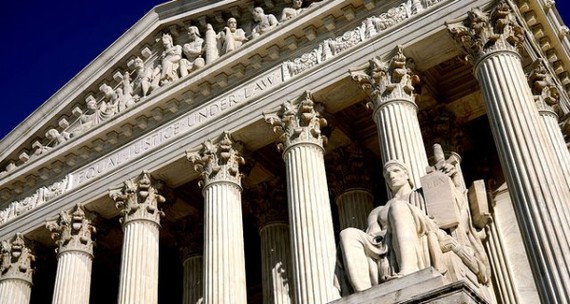By nominating longtime federal appeals court judge Merrick Garland, President Barack Obama has put the ball firmly in the Senate's court. The president has made his choice, and taken the first step towards filling the vacancy left by Associate Justice Antonin Scalia.
With this particular nomination, President Obama has also skillfully called the Senate Republican's bluff. Garland is a moderate, thoughtful jurist with a long history of writing equally moderate, thoughtful opinions. Instead of selecting a dyed-in-the-wool liberal, the president has put forward a Democratic nominee even Ken Starr can love. Garland is the judicial equivalent of oatmeal: good for everyone under the circumstances, a plainly unobjectionable staple, and -- at the risk of mixing my metaphors -- American as apple pie.
In any other circumstances, many Republicans would call Garland's nomination a win. Why? Because despite a Democrat in the White House, Garland's pick doesn't create a hard left turn on the high court. President Obama made the safe pick, but the GOP-led Senate is still pouting about the fact that the president gets to make any pick at all. As a result, Republicans look obstructionist and unreasonable, like kindergarteners taking their marbles home pending the outcome of the next election. It is this kind of partisan tantrum that turns off voters, and that's not good for our democracy.
Elections do matter, and they do have consequences. The fact is, the American people have spoken on the issue of the U.S. Supreme Court. We spoke when we re-elected President Obama in 2012. We also spoke in 2014 when we elected a Republican Senate majority to provide their advice and consent. Most recently, the people have spoken in polls where, by a 2-to-1 margin, we've said that we want hearings and a vote on Garland's nomination. Yes, the people most definitely have spoken. The voters have assigned all the roles to the various players in this constitutional drama. Now it's time for the Senate to actively play their part.
Of course the Senate should honor their constitutional duties by fairly and expeditiously vetting the nominee, and then holding a timely up-or-down vote. There is plenty of time for a thoughtful process, and everyone seems to understand that except perhaps Senate Majority Leader Mitch McConnell (R-KY). Actually, I believe Sen. McConnell knows this too, he just has other priorities. It's too bad -- for the Senate and the nation -- that good stewardship of the Senate does not seem to be one of them.
In these atypical, divisive and increasingly chaotic political times, it would be reassuring for the American people to witness the Senate acting in a wise, thoughtful, and constitutional manner. Yet right out of the gates, most Republicans were against any action whatsoever, no matter whom the nominee might be. All nominees were to be blocked, regardless of precedent or good government or constitutional duty. Senators vowed to not even give a nominee the basic courtesy of a meeting, let along a hearing, believing no Supreme Court nominations should move forward in an election year. While there's been some softening of this opinion on the margins, mostly in the form of vulnerable GOP senators facing tough re-elections, the Senate Republicans have largely stood firm.
And thus Majority Leader McConnell, normally known and respected for his smart strategies and parliamentary maneuvers, seriously overplayed his hand. This new election year nominations "rule" is so blatantly self-serving, it not only makes the Republicans look bad, it also undermines the prestige of the Senate as a whole.
There are pending cases before the court that will greatly impact the everyday lives of women and their families all around the country. If the Senate does not act, the Supreme Court will not have a full complement of justices for the bulk of two court terms. This unprecedented delay could have dangerous consequences not only because it creates uncertainty in our courts, but also because it undermines the traditions of our constitutional system of judicial succession for the highest court in the land.
We are fortunate as a country to have a constitutional process that can see us smoothly through this transition. The president completed the first step, now it's the Senate's turn. Election year or not, the American people deserve a full court.

